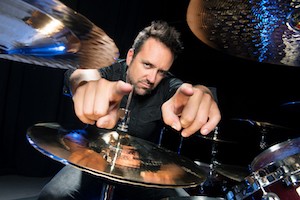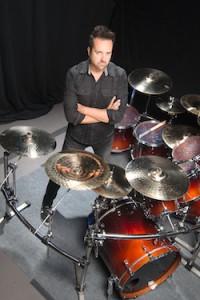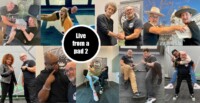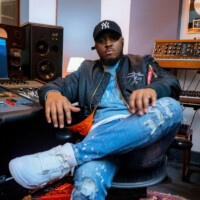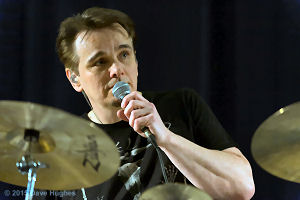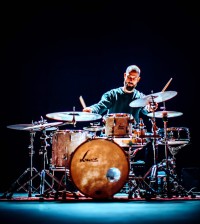What fascinates us about metal music. The heavy guitars? The screaming vocals? Sure that’s nice, but what would metal music be without heavy, fast, frantic drums?!
One of the masters of that field is Jon Dette.
We all have those first albums we started playing drums too, but Jon managed to go from teaching himself from those first albums to actually playing and touring with his childhood-hero bands – in his case, two of the biggest metal bands out there: Anthrax and Slayer!
All this and a 20 year career during which Jon has laid down the grooves for bands like Testament, Iced Earth, Animetal USA and many more.
I caught up with Jon via Skype to chat about his upbringing, his path onto the biggest stages in the world, his double kick work and his exciting new project Meshiaak.
You started off into metal pretty early. Even your first drum kit had two kick drums, right?
Yeah, well I was in an elective class at my junior high school and that really was the first time, at age 13, that I was seriously listening to music. I tried the tuba, the trumpet,… literally every instrument and the snare drum was the last instrument that I finally tried and immediately connected with. I really stuck with it and just knew I had to get a drum set for my 14th birthday. My parents were divorced and didn’t really talk so I figured I had a 50/50 shot if I just asked both of them for a drum set for my birthday. What ended up happening was that I got a drumset from both of them. My dad got me a sparkle red CB700 5-piece, my mum got me a sparkle blue Reuther (by Pearl).
On that same birthday my brother got me the Anthrax ‘Fistful of Metal’ record, which had just been released a few months earlier in April ’84, and as soon as I heard the first song ‘Deathrider’, I was just blown away by the drumming. Listening to that music I quickly realised that I could hear what the drums were doing. I couldn’t play 95% of it but I quickly identified that those were kick drums going really fast together and all the other stuff Charlie Benante was doing. I was like: “Wait a minute! I’ve got a double bass drum kit here, I can play this stuff…” So the first song I ever tried playing on the drum set was ‘Metal Thrashing Mad’. I just started self-teaching myself from that record. It took a long time but I think within six or seven months I was able to play those songs to some extend.
So yeah, that was my first kit. I wish I still had that thing…
And it was metal from then on?
I was into Judas Priest before that. They were the first metal band I got introduced to. Then I started listening to Iron Maiden a little bit, but once my birthday came around and I got that Anthrax record, that was it. After that I discovered that Metallica had just released ‘Kill ‘Em All’ and also Slayer had just brought out “Show No Mercy”. Cool thing about all those bands is that all three of them (Metallica, Anthrax, Slayer) really came onto the scene with their debut records within six months from each other. It was a good time to become a Metal drummer!
Did you ever have lessons before you went to study at the Musicians Institute in L.A.?
Well, I was in the marching band in high school where I received some sort of sight reading and rudiment training and all that. It might seem goofy to be marching around with a snare drum but it really developed some endurance for me because the dynamics there are: hit hard and hit really hard. That ended up being very compatible with my style.
I also took some 1-to-1 lessons from a jazz instructor once I got into high school who identified some bad habits I had and sorted them out.
But yeah, once I went to M.I. that’s where I really got into a lot of stuff. The great thing about M.I. was that I quickly realised what the drummer was I wanted to be and identified the drummer that I did not want to be. M.I. was really geared to prepare you as a musician to go out into any field of music and get hired. You would learn different styles of music and this and that. It was great to learn all this stuff but I had no interest in playing samba, jazz or blues. It’s fun to listen to this stuff but it wasn’t fun for me to play it.
It was a great experience going through that because I needed it to discover who I am as a musician. The irony is that when I’m at home in San Diego, I listen to all kinds of music but metal. I’ll be jamming me some Gordon Lightfoot before I’m jamming Kill Switch Engage.
To go back, yes, I did have some formal training: I can sightread, I can identify different styles of music but at the end of the day I’m a Heavy Metal drummer and I have absolutely zero interest in being any other type of musician.
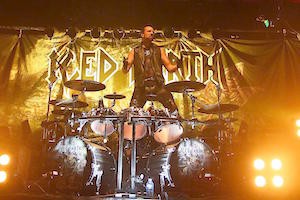 You moved back to San Diego after finishing MI. Where did it go from there?
You moved back to San Diego after finishing MI. Where did it go from there?
Yes I moved back and tried starting a band with some friends from high school. We played a couple of clubs but never really did anything major. Then ultimately a friend from L.A. told me about a band called Evil Dead that was looking for a drummer. Some of the guys were in an 80s band called Agent Steal, so they had a small deal with a German label and it was my first opportunity to get into something that was already put together. I auditioned, got the gig and from then on I was driving up to L.A. once a week for rehearsals.
Because of that I moved back up to L.A. in 1994 and about four months later I got the opportunity to audition for Testament. That was a really big deal for me because they were one of the bands I listened to when I was growing up and I was big fan. I auditioned for them in the bay area, got the gig and had to move up to Oakland. That was really where things just took off for me. I was with Testament for about one and a half years and then had the opportunity to audition for Slayer. They offered me the gig the second night we were rehearsing, it felt so good. I joined Slayer but about a year and a half later they decided they wanted to bring Paul Bostaph back in and I went straight back into Testament and stayed with them again for a year.
The unfortunate thing that I always joined these bands right after they had recorded albums, so although I was joining them as a full member, I probably looked like a touring drummer on the outside. I wish I had that stamp. I think things would be different for me now if I had a record from the 90s under my belt.
You have managed to end up playing for most of your ‘teenage heroes’ bands. That must have felt weird.
Not so much weird but exciting and surreal! The biggest thing for me was just to not overthink it because if I started to think “Oh my god, I’m in a room with this guy and that guy!” I would have freaked out. I really just had to let all that go and say to myself: Ok, you’re here because someone heard you play and it’s important enough for them to take the time to see if they wanna jam and work with you. Two entirely different things by the way.
Going back to the M.I. thing we talked about earlier where they prepare you to go into different situations playing different beats in different genres – I didn’t have to learn that with those guys. Even more so because these were the bands that I predominantly taught myself how to play drums with, I knew almost all of the songs that they wanted to play. It wasn’t really practising the songs, it was more just preparing. I had played all of these songs just for fun and with high school bands at parties, it was really a part of me.
I do remember my first tour though on a proper bus on a headline tour with Testament. I remember being in my bunk and just couldn’t believe it. I opened my curtain, Chuck Billy’s bunk was right across, I ripped open his curtain (which is a big no-no by the way), he’s laying there reading a book and I just go: “This is so f***ing cool!”. [laughs]
I just couldn’t help myself, I was so excited. I think through the years as this becomes your business and your career it’s important to remember those moments because it’s important to remember why you’re doing this. It’s easy to become clouded and maybe a little desensitised once the business aspects start taking over and no matter how hard your band is or how big they are, whether you’re playing for some of your idols, always remember why you’re doing this. For me personally it’s been one of the greatest joys of my life being able to play for those bands.
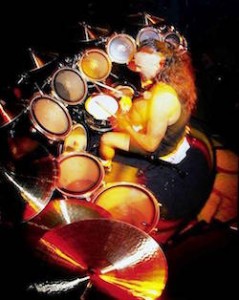 Tell me about your new band Meshiaak. How did you guys get together?
Tell me about your new band Meshiaak. How did you guys get together?
Back in 2013 I was down in Australia performing at the Soundwave festival where I was actually playing for Slayer and Anthrax. That’s a story on itself: I was on stage with Anthrax from 1 till 2 o’clock, off stage for 90 minutes and then back with Slayer from 3.30 till 5. The publicist who was assigned to those bands had a friend there called Danny Camilleri who was putting a project together. He saw me play and really wanted to start something with me. I got a call from the publicist six months later saying I should check the guy out and that he had some great stuff. I’m like: Yeah, but it’s Australia. It’s not that I just jump in the car and be right over, it’s 7000 miles away. So I initially turned it down. He kept pushing me to check it out though so I finally listened to the demos and was just really blown away. In particular the fact that in the title track of the album Danny is actually using a singing voice, not just a screaming voice. That’s what made me think this could be a Metal band that goes places. We talked on the phone and I signed on to do the record – I didn’t wanna join a band straight away without ever having met these guys. We set a time to track drums in Oakland and all the guys flew out to be there. Technically it was unnecessary for them to be there but it was the best thing because it was the first time we had a chance to meet and we all immediately bonded. We went into the studio to make a record but we came out of the studio as a full band. That’s really where Meshiaak was born.
Your debut album ‘Alliance of Thieves’ just came out?
Yes, I could not be happier with the record and I’m really proud of the drum performance. I think it’s probably been 20 years of my career that people wanted to know what I sound like writing drums for a record: well, here you go. I had no parameters that I was held back from, the music is great on top of it, the solos are incredible, the singing is phenomenal – this is a record that I can truly present to people and go: this is me.
I’ve been waiting a long time to find the right band that I can consider myself being a full member of, being there from the ground up and being part of the creative process. This isn’t me being told to play this beat here, this beat there, it’s all me. I never thought it would be with a bunch of guys half way around the world but I guess things happen when they happen. I’m just so proud to be a part of this band. It’s a new chapter for me because for the last 20 years I’ve been a drummer in existing bands. It’s been an honour and a privilege to be part of those bands but to finally start something from scratch is just incredible.
The eternal question: two kick drums vs. double kick pedal?
Yeah, what about it?! Double pedal for me is like swimming at the kiddy end of the pool with those floaty things around your arms. Rip those floaties off and swim down to the deep end of the pool where the big boys play! [laughs].
I’m not a double pedal fan at all. I think it’s a practical application for people that are playing small places or for drummers where double bass is more of an accentuated part of their style rather than a foundation of it. Being a metal drummer personally I just think that using a double pedal is just…. I don’t know. Each to their own.
Personally I just don’t like the response of two beaters hitting one kick drum head. It has that weird play to it when you’re doing long double bass rolls for extended periods of time.
Also I don’t like the constriction. I’m a tall guy, I’m 6ft4. If you see pictures of my kick drums you’ll see they’re further apart than most double bass set ups. That’s just because I naturally sit like that and it’s easier for me. Having a double pedal with a rod that long just wouldn’t work.
I have absolutely no desire to play one of those things in any setting application ever.
I have even been offered to do a tour where they said: “Well, we’ll only be able bring out a single kick.” And I said that’s a deal-breaker. Count me out, I have no interest in going on tour to play a double pedal. [laughs]
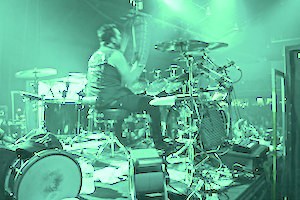 Did you have any specific exercises to get your feet up to speed?
Did you have any specific exercises to get your feet up to speed?
One of the best exercises is simply playing to records. I’ll use ‘Angels Of Death” as an example because it’s an identifiable song for double bass. If you try playing that song by yourself in a room with just the metronome, once your legs start to fatigue a lot of people just give up. If you have the music one and it comes to that chorus – and you can feel your legs just dying – the energy just drags you along and you push through. As soon as the double bass ends I would still perform the song. I almost equate it to being at the gym with a personal trainer. If you do benchpress you know he’s their to pull the weight up if you fail, but he’ll also be yelling at you “You can do this”! They create that intensity. When you’re hearing Tom Araya scream, you’re hearing those guitars and you’re feeling the intensity of the song it’s so much more than just sitting in a room trying to practise double bass. There’s a different focus behind it now.
I do have a form of exercise though called Tabata. It’s invented a Japanese guy called Izumi Tabata and it was designed for power weight lifters. You do 20 seconds of intense work of whatever it is, and then 10 seconds of rest. You repeat that eight times which makes it four minutes long. 20 seconds of all your power. I don’t mind if it’s push-ups, sit-ups, bench press or double bass. This is not about playing the bass drums properly, it’s about high intensity. Go as hard as you can. If you’re playing double bass at let’s say 180bpm, by the second or third round these should sound more like flams. If they still sound nice, then we need to up the tempo. It’s a physical exercise and the goal is failure. In most cases when people who start fatiguing on double it’s not because of their technique, it’s because muscle failure. “Oh that burn in my chin!”. You work those muscles and you’ll be able to play longer, faster and stronger. I was teaching this at a Thomas Lang drum camp a few years ago and even Thomas was struggling by the end of the exercise. I hope he doesn’t get bummed that I say this. [laughs] He had to stop and was sweating…
Yeah, that’s one of the best exercises I teach to people who want to increase their speed and endurance.
You have a great way of distributing the energy of your legs during a show too. Tell me more about that.
Yes, it’s a kind of energy conservation thing. I obviously play left-handed but when I play single patterns I alternate with my feet. If you were standing behind me watch me play for example the solo section in Angel Of Death, it’s just a really fast polka beat, one kick and one snare at about 180 – 200 Bpm. I would play for example eight bars with my left foot, then for the next eight bars I would use my right foot. I do this pretty much with every song I ever play. The reason for that is that I like to distribute the energy between my legs so that they’re both equal when they’re going into a double bass part. If you’re only using your primary foot (if you’re right handed, your right) all through that single stuff and the left foot is just sitting on a hihat pedal, when it’s time to come in with the double bass at 200bpm all out your left foot is not as warmed up as the right foot. Now you want it to just go balls out but it might not be ready for that. Conversely you have a right foot that’s been doing all this work and now you want that fatigued foot to go into a fast pattern.
Now you have one foot that’s not warmed up and one that’s pre-fatigued.
My solution to that is that I use both feet. In my case it would be the left one that’s more fatigued so I will give it a break and switch things back and forth. That way when you come into a double bass part it’s more powerful, it’s more impactful and it doesn’t sound fatigued. Especially for this kind of music I treat this as an athlete – and I’m talking football, not golf. [laughs]
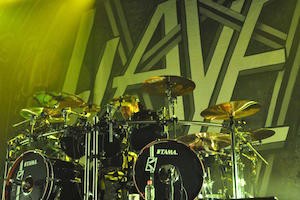 Talking about treating it as an athlete. How do you keep fit to stay on top of the game?
Talking about treating it as an athlete. How do you keep fit to stay on top of the game?
I generally train when I’m home, do some mild training when I’m out on tour, lift weights and eat a healthy diet. I’ve been eating a paleo diet for several years on and off and just switched over to a ketonegic (high-fat, adequate-protein, low-carbohydrate) diet but I’m not a monk. I’m human and I like to enjoy life. The last few tours I probably enjoyed a bit more than I should have because I put on a little bit of a tour-gut. We’ve been touring Germany a lot, they have some great beers. Guilty! I’m home now working that off.
I believe in a lot supplementation as well. The Anthrax and Slayer guys always make fun of me because I show up on tour with a suitcase just filled with supplements. Fish oil, green powder drink, protein drink and so on. I just like to keep a lot of minerals in my body. I take some stuff before I go on stage and I’ll have a recovery drink right after I get off stage.
On the other hand I can go long periods without playing drums. It might sound weird but I’m not one of those drummers that gets into a room and just wants to woodshed for hours on end. I’m the other guy. I get off tour and won’t touch a drumset for two months. My fiance and I are out riding wave runners or wakeboarding – just having fun. But I can’t go longer than a week tops without doing physical activity because if I don’t keep up my physical base, that’s what’s gonna do me in. I’m 46 now and it’s more important now than it ever has been for me to continue that. I picked the wrong style of music to age with. [laughs]
Seeing how full on the shows are, do you warm up before a gig?
Yeah, in the first week of a tour I would warm up probably 30 minutes before the show. Just some simple single strokes and double strokes on a pad, whatever feels good. I don’t have a particular routine. Then I’ll play a couple of songs in my head or play along on a chair and simulating double bass on the floor.
When I get into week two and beyond it could be maybe just ten minutes of doing that. I do a fair amount of stretching before I go on stage and that’s really about it.
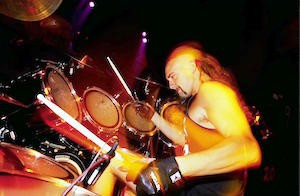 I’ve gotten to this point where it seams like the more I don’t overthink things before going on stage or recording something, it seems like I have a better performance.
I’ve gotten to this point where it seams like the more I don’t overthink things before going on stage or recording something, it seems like I have a better performance.
Everybody is different but I’ve just learned what’s best for me and it really doesn’t require a whole lot of effort before going on stage.
Finally, what’s next?
I’ll be heading out on tour with Anthrax to be filling in some dates for Charlie on the Anthrax/Slayer tour that’s going on here in States right now and then after that all the focus is on the new band Meshiaak and getting us out on tour – hopefully by the end of the year but certainly early 2017. I’m just so proud of the record. Everyone go and check out ‘Alliance of Thieves’ by Meshiaak.
Thanks a lot for your time Jon and all the best for the new project!
Interview by Tobias Miorin
November 2016

